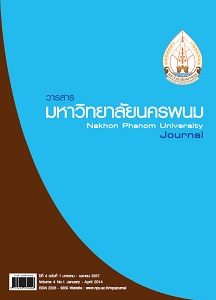การพัฒนาผลสัมฤทธิ์ทางการเรียน ความเชื่อมั่นในตนเอง การคิดวิเคราะห์ และเจตคติ ต่อการเรียน กลุ่มสาระการเรียนรู้การงานอาชีพและเทคโนโลยี ชั้นมัธยมศึกษาปีที่ 3 ด้วยการจัดการเรียนรู้ตามแนวทฤษฎีคอนสตรัคติวิสต์
Main Article Content
Abstract
การวิจัยครั้งนี้มีวัตถุประสงค์เพื่อ 1) หาประสิทธิภาพของแผนการจัดการเรียนรู้กลุ่มการงานอาชีพและเทคโนโลยี ชั้นมัธยมศึกษาปีที่ 3 ตามแนวคอนสตรัคติวิสต์ตามเกณฑ์ 80/80 2) หาค่าดัชนีประสิทธิผลของแผนการจัดการเรียนรู้ 3) เปรียบเทียบ ผลสัมฤทธิ์ทางการเรียน ความเชื่อมั่นในตนเอง การคิดวิเคราะห์ และเจตคติต่อการเรียนของนักเรียน กลุ่มเป้าหมาย คือ นักเรียน ชั้นมัธยมศึกษาปีที่ 3 ปีการศึกษา 2554 โรงเรียนบ้านโสกปลาดุก จังหวัดชัยภูมิ จำนวน 21 คน ซึ่งได้มาโดยการสุ่มแบบกลุ่ม เครื่องมือ ที่ใช้ในการวิจัย ได้แก่ แผนการจัดการเรียนรู้ตามแนวทฤษฎีคอนสตรัคติวิสต์ จำนวน 40 แผน มีคุณภาพอยู่ในระดับมากที่สุด ( = 4.67) แบบทดสอบผลสัมฤทธิ์ทางการเรียน จำนวน 30 ข้อ ค่าอำนาจจำแนก 0.30-0.79 ค่าความเชื่อมั่นเท่ากับ 0.88 แบบวัดความเชื่อมั่นในตนเอง จำนวน 50 ข้อ มีค่าความเชื่อมั่น 0.73 แบบวัดทักษะการคิดวิเคราะห์ จำนวน 25 ข้อ มีค่าอำนาจจำแนก 0.25-0.73 ค่าความเชื่อมั่นเท่ากับ 0.86 แบบวัดเจตคติต่อการเรียน จำนวน 20 ข้อ มีค่าความเชื่อมั่น 0.88 วิเคราะห์ข้อมูลโดยใช้ ร้อยละ ค่าเฉลี่ย ส่วนเบี่ยงเบนมาตรฐานและทดสอบสมติฐานด้วย t-test (Dependent Samples) 1) แผนการจัดการเรียนรู้ ตามแนว คอนสตรัคติวิสต์ กลุ่มสาระการเรียนรู้การงานอาชีพและเทคโนโลยี ชั้นมัธยมศึกษาปีที่ 3 มีประสิทธิภาพเท่ากับ 96.99/89.68 ซึ่งสูงกว่า 80/80 ที่ตั้งไว้ 2) ดัชนีประสิทธิผลของแผนการจัดการเรียนรู้ ตามแนวคอนสตรัคติวิสต์ กลุ่มสาระการเรียนรู้การงานอาชีพ และเทคโนโลยีชั้นมัธยมศึกษาปีที่ 3 มีค่าเท่ากับ 0.8059 แสดงว่านักเรียนมีความก้าวหน้าทางการเรียนเพิ่มขึ้น ร้อยละ 80.59 3) ผลสัมฤทธิ์ทางการเรียนของนักเรียนหลังเรียนสูงกว่าก่อนเรียนอย่างมีนัยสำคัญทางสถิติที่ระดับ .01 4) ทักษะการคิดวิเคราะห์ของ นักเรียนหลังเรียนสูงกว่าก่อนเรียนอย่างมีนัยสำคัญทางสถิติที่ระดับ .01 5) ความเชื่อมั่นในตนเองของนักเรียนหลังเรียน สูงกว่าก่อนเรียน อย่างมีนัยสำคัญทางสถิติที่ระดับ .01 6) เจตคติต่อการเรียนรู้ของนักเรียนหลังเรียน สูงกว่าก่อนเรียนอย่างมีนัยสำคัญทางสถิติที่ ระดับ .01
This study aimed to : 1) find out efficiency of the learning management plan in the learning substance group of work, occupation and technology for Mathayom Suksa 3 students using constructivist-based instruction via the criterion set at 80/80, 2) find out an effectiveness index of the learning management plan, and 3) compare students’ learning achievement, self-confidence, analytical thinking and learning attitude. The target group was 21 Mathayom Suksa 3 students in academic year 2011 at Ban Sok Pla Duk School, Chaiyaphum province who were selected by cluster random sampling. The instruments used were a total of 40 constructivistbased learning management plans, whose quality was at the highest level (mean = 4.67); a 30-item test of learning achievement, whose discrimination power values ranged between 0.30 and 0.79 and reliability value was 0.88; a 50-item test of self-confidence, whose reliability value was 0.73; a 25-item test of analytical thinking skill, whose discrimination power values ranged between 0.25 and 0.73 and reliability value was 0.86; and a 20-item test of learning attitude, whose reliability value was 0.88. Data analysis was done using percentage, mean, standard deviation and t-test (dependent samples) for hypothesis testing. The findings of study revealed as follows : 1) The constructivist-based learning management plan in the learning substance group of work, occupation and technology for Mathayom Suksa 3 students had efficiency of 96.99/89.68, which was higher than the criterion set at 80/80; 2) the effectiveness index of the constructivist-based learning management plan in the learning substance group of work, occupation and technology for Mathayom Suksa 3 students had a value of 0.8059, which showed that students had their increased advancement of 80.59% in learning; 3) the students’ learning achievement after learning was significantly higher than that before learning at the .01 level; 4) the students’ analytical thinking skill after learning was significantly higher than that before learning at the .01 level; 5) the students’ self-confidence after learning was significantly higher than that before learning at the .01 level; and 6) the students’ learning attitude after learning was significantly higher than that before learning at the .01 level.


